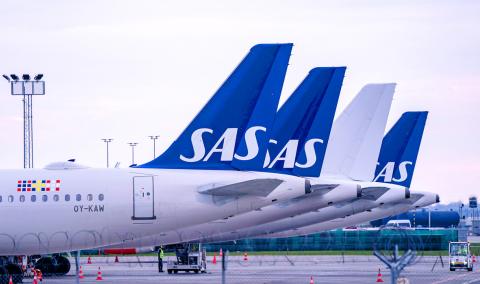The Swedish government yesterday presented a package of measures worth more than 300 billion kronor (US$30.94 billion) to support the economy in the face of the COVID-19 pandemic.
The package included measures such as the central government assuming the full cost for sick leave from companies through next month and May, as well as the brunt of the cost for temporary redundancies due to the crisis.
On Sunday, airline SAS AB, which is partially owned by the state, announced that it would temporarily lay off up to 90 percent of its staff.

Photo: Reuters
The biggest cost will come from allowing companies to put off paying tax and value-added tax for up to a year — retroactive to the start of this year — which Swedish Minister of Finance Magdalena Andersson said by itself could cost up to 300 billion kronor in the short term.
“This is a completely unique situation for the Swedish economy,” Andersson told a news conference. “We want this decision to mean that as many companies as possible get through this crisis so that we can protect Swedish companies and Swedish jobs.”
Sweden is in a strong position to bear the financial costs of the outbreak with strong government finances and government debt at its lowest since the late 1970s, Andersson said.
Sweden has already announced extra cash for local authorities to help fight the pandemic, while the Swedish central bank has provided up to 500 billion kronor in loans to firms through the banking system.

Stephen Garrett, a 27-year-old graduate student, always thought he would study in China, but first the country’s restrictive COVID-19 policies made it nearly impossible and now he has other concerns. The cost is one deterrent, but Garrett is more worried about restrictions on academic freedom and the personal risk of being stranded in China. He is not alone. Only about 700 American students are studying at Chinese universities, down from a peak of nearly 25,000 a decade ago, while there are nearly 300,000 Chinese students at US schools. Some young Americans are discouraged from investing their time in China by what they see

Taiwan Transport and Storage Corp (TTS, 台灣通運倉儲) yesterday unveiled its first electric tractor unit — manufactured by Volvo Trucks — in a ceremony in Taipei, and said the unit would soon be used to transport cement produced by Taiwan Cement Corp (TCC, 台灣水泥). Both TTS and TCC belong to TCC International Holdings Ltd (台泥國際集團). With the electric tractor unit, the Taipei-based cement firm would become the first in Taiwan to use electric vehicles to transport construction materials. TTS chairman Koo Kung-yi (辜公怡), Volvo Trucks vice president of sales and marketing Johan Selven, TCC president Roman Cheng (程耀輝) and Taikoo Motors Group

MAJOR DROP: CEO Tim Cook, who is visiting Hanoi, pledged the firm was committed to Vietnam after its smartphone shipments declined 9.6% annually in the first quarter Apple Inc yesterday said it would increase spending on suppliers in Vietnam, a key production hub, as CEO Tim Cook arrived in the country for a two-day visit. The iPhone maker announced the news in a statement on its Web site, but gave no details of how much it would spend or where the money would go. Cook is expected to meet programmers, content creators and students during his visit, online newspaper VnExpress reported. The visit comes as US President Joe Biden’s administration seeks to ramp up Vietnam’s role in the global tech supply chain to reduce the US’ dependence on China. Images on

New apartments in Taiwan’s major cities are getting smaller, while old apartments are increasingly occupied by older people, many of whom live alone, government data showed. The phenomenon has to do with sharpening unaffordable property prices and an aging population, property brokers said. Apartments with one bedroom that are two years old or older have gained a noticeable presence in the nation’s six special municipalities as well as Hsinchu county and city in the past five years, Evertrust Rehouse Co (永慶房產集團) found, citing data from the government’s real-price transaction platform. In Taipei, apartments with one bedroom accounted for 19 percent of deals last